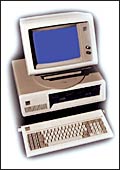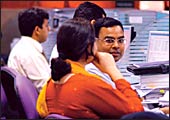 |
| Unhappy man: Jet Airways' Goyal is facing
serious charges |
There
is little doubt that Naresh Goyal, 56, created one of India's
best airlines. However, there has always been a cloud over how
Goyal, a Non-Resident Indian (NRI), got the funding to start his
airline. In the US, where Jet Airways was supposed to start flights
in July 2005, its security clearance has been held up.
To make matters worse, it emerged after the
recent security scare at London's Heathrow Airport that Amin Asmin
Tariq, a Jet Airways employee, was among the suspects. Jet immediately
suspended Tariq and clarified that it had been "compelled"
to hire him because of UK employment laws. Despite the clarification,
the UK now plans to review Jet Airways' security clearance. There
are reports that even Singapore wants to do the same. But Goyal
is not without powerful friends. Civil Aviation Minister Praful
Patel recently assured Parliament that the government had no reason
to suspect that Jet was "financed by underworld elements".
Goyal, who is among the most
written about personalities this year, was also "alleged"
to have met Subroto Roy of Sahara India Parivar to revive the
dead and buried proposal to merge Jet and Air Sahara. There was
also speculation about a settlement. But Air Sahara vociferously
denied the developments the next day.
And while all this was going on, the Jet
Airways scrip actually did decently well on the indices, climbing
10.4 per cent in the week of August 14-18 week. Yet, the stock
is still trading at just over half its issue price of Rs 1,100.
Goyal hasn't had a great year, and he must be hoping that both
he and his airline hit calmer waters soon.
-Kushan Mitra
NUMBERS
OF NOTE
30 per cent: China's share
of the world apparel trade; Mexico is in second place with a 9.5
per cent share and India is a distant third with 4 per cent
Rs 55.2: The
net hourly pay in Delhi compared to Rs 63 in Mumbai, Rs 897 in
Zurich and Rs 690 in London, according to a study published by
UBS
30,000: The
number of deaths in the UK every year due to obesity; the figure
is 10 times higher in the US
1.64 per cent:
SBI's wage bill as a proportion to its total assets, compared
to 0.43 per cent for ICICI Bank and 0.36 per cent for UTI Bank
7.246 million:
The number of passengers who flew within the country in the
first three months of 2006-07, up from 4.99 million in the corresponding
period in the previous year
Rs 44,700 per
kilolitre: The average price of aviation turbine fuel in August,
up from an average price of Rs 34,100 per kilolitre in August
last year
Rs 4-6 crore:
The cost per km of constructing a highway in India
77 per cent:
The number of US households that had air-conditioning in 2001,
the most recent year for which government statistics are available,
against 56 per cent in 1978. All evidence suggests that it has
continued to climb since then
4,000: The
number of private schools in Delhi. Of these, only half are recognised
by the government
 $8
billion (Rs 37,600 crore): The amount that will be generated
by Macau's gaming halls in 2007, helping it leap-frog ahead of
the Las Vegas Strip as the world's largest casino market by then $8
billion (Rs 37,600 crore): The amount that will be generated
by Macau's gaming halls in 2007, helping it leap-frog ahead of
the Las Vegas Strip as the world's largest casino market by then
20: The
number of foreign movies screened in China last year; 16 of them
were from the US
$1,565: Price
of the first PC (cream-coloured 5150) introduced by IBM 25 years
ago in August, 1981. The machine boasted 16K of memory, the size
of a couple of terse modern e-mails or about 1 per cent of a floppy
disk
NOTED
 INDUCTED:
By The IndUS Entrepreneurs (TiE)-a worldwide network of
entrepreneurs and professionals of Indian origin-Infosys Technologies
co-founder and chairman N.R. Narayana Murthy, on to its board
of trustees. The organisation fosters entrepreneurship globally
through mentoring, networking, and education and now has 44 chapters
in nine countries and a membership of over 12,000. INDUCTED:
By The IndUS Entrepreneurs (TiE)-a worldwide network of
entrepreneurs and professionals of Indian origin-Infosys Technologies
co-founder and chairman N.R. Narayana Murthy, on to its board
of trustees. The organisation fosters entrepreneurship globally
through mentoring, networking, and education and now has 44 chapters
in nine countries and a membership of over 12,000.
SELECTED: By
the Board of Control for Cricket in India (BCCI), Pantaloon's
as the formal wear provider and sponsor for Team India. Lalit
Modi, Chairman, Marketing Committee, BCCI, said Pantaloon's Rs
20-crore offer for four years had been approved by the working
committee of the board.
DROPPED: By
GlaxoSmithKline, the controversial application to patent a key
AIDS drug in Thailand and India. Glaxo, which introduced the drug
Combid in Thailand four years ago, says it will withdraw the patent
applications for the drug.
PROJECTED: By
the Prime Minister's Economic Advisory Council, a 7.9 per cent
growth in Gross Domestic Product for 2006-07. This means the Indian
economy will have averaged 8 per cent growth over a four-year
stretch for the first time ever.
PROPOSED: By
the West Bengal State Electricity Board (WBSEB) a plan to write
off Rs 10,000-crore accumulated losses. The landmark development
by the board is sure to put pressure on the state exchequer, but
there will be an immediate downward revision in tariff for WBSEB's
45 lakh consumers.
 LAUNCHED:
By Hindustan Motors, the Rs 29.7-lakh Montero, a premium SUV.
This will be followed by another SUV, the Outlander, in early
2007 and a new premium-segment mini van-cum-sedan Grandis thereafter. LAUNCHED:
By Hindustan Motors, the Rs 29.7-lakh Montero, a premium SUV.
This will be followed by another SUV, the Outlander, in early
2007 and a new premium-segment mini van-cum-sedan Grandis thereafter.
FILED: By the
Karnataka government, a lawsuit in a civil court against Coke
and Pepsi. This is the first such case filed by state against
the cola giants. Says state Health Minister R. Ashok: "The state
itself conducted tests and found the level of chemical pesticides
higher than the permitted levels."
THE
REAL PAY OF SENIOR MANAGERS
The
next time you convert your US cousin's dollar salary into rupees
and go green with envy, consider this: he probably earns less
than you. A survey, conducted across 29 countries by the US-based
Hay Group, adjusts the cost of living and rental expenses against
incomes in various countries and arrives at the real income that
senior managers actually take home. One caveat, the figures have
also been adjusted for purchasing power parity. The survey shows
that managers in countries with very high rates of taxation, such
as Sweden, are much worse off than those in, say China or Poland.
The global average pay for a senior manager is m59,651.
DRESS
CODE FOR ACCOUNTANTS
 |
| Spit and polish: A sign of the future |
When a practising
chartered accountant (CA) meets any "external authority"
for any official purpose, he will have to wear formal dress-full-sleeve
shirt, tie and shoes (or saris or salwar kameez for women). The
central council of the Institute of Chartered Accountants of India
(ICAI), the governing body, has come up with this dress code amid
confusion and inhibitions among CAs across the country.
Says ICAI President T.N. Manoharan: "This
is only recommendatory in nature and is not mandatory." Manoharan,
however, expects his fellow chartered accountants to follow the
"recommendations". The other rider: the code is applicable
only to professionals working in their individual capacity or
as partners in a CA firm. It will not apply to those who are employed
in the corporate sector. Says Abhijit Bandyopadhyay, a central
council member of ICAI: "We are trying to ensure that CAs
are properly dressed when they attend official meetings. So there
is no reason why it shouldn't work." He adds that ICAI will
be liberal in implementing this code and will make concessions
for CAs who live and work in small towns and non-urban centres.
But surely, there are other more pressing
matters it should be addressing than improving the sartorial sense
of its members.
-Ritwik Mukherjee
|




 $8
$8 INDUCTED:
INDUCTED:
 LAUNCHED:
LAUNCHED: